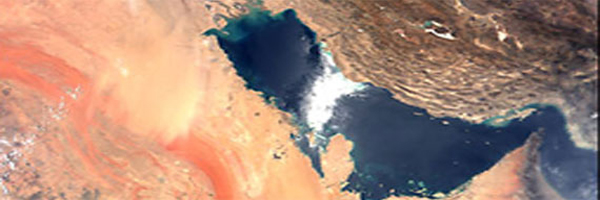The Water Cycle and Climate Change
Image: The Persian Gulf from the Moderate Resolution Imaging Spectroradiometer (MODIS) on the Terra satellite. Arid regions like this may face increasingly severe water shortages as global climate changes.
(Image by Brian Montgomery, Earth Observatory, and Mark Gray, MODIS Atmosphere Group, NASA GSFC.)
Amongst the highest priorities in Earth science and environmental policy issues confronting society are the potential changes in the Earth's water cycle due to climate change. The science community now generally agrees that the Earth's climate will undergo changes in response to natural variability, including solar variability, and to increasing concentrations of greenhouse gases and aerosols. Furthermore, agreement is widespread that these changes may profoundly affect atmospheric water vapor concentrations, clouds, and precipitation patterns. For example, a warmer climate, directly leading to increased evaporation, may well accelerate the hydrologic cycle, resulting in an increase in the amount of moisture circulating through the atmosphere. Many uncertainties remain, however, as illustrated by the inconsistent results given by current climate models regarding the future distribution of precipitation.
A WARMER CLIMATE, DIRECTLY LEADING TO INCREASED EVAPORATION, MAY WELL ACCELERATE THE HYDROLOGYC CYCLE
Related Links:
Browse Quotes and Proverbs...
Cool Quotes Vol. 1
If silence is golden, then speech is platinum...
Cool Quotes Vol. 2
If you are too careful, you are so occupied in being...
Cool Quotes Vol. 3
The only time to eat DIET FOOD is while you're waiting...
Wise Old Sayings
One today is worth two tomorrows...

Education
Many people benefit from knowledge and interesting facts...Did You Know?
Of the various components that are found in the human body, water occurs in the largest quantity. As a food substance, it is an extremely important feature of a person's diet. Its chief purpose is to replenish the liquids of the body and to assist in the digestion of food.
Although nature provides considerable amounts of water in most foods, large quantities must be taken in the diet as a beverage. In fact, it is the need of the body for water that has led to the development of numerous beverages. Besides being necessary in building up the body and keeping it in a healthy condition, water has a special function to perform in food preparation and cooking.
Ranking next to water in the quantity contained in the human body is mineral matter. This constituent, which is also called ash or mineral salts, forms the main part of the body's framework, or skeleton.
In the building and maintaining of the body, mineral salts serve three purposes--to give rigidity and permanence to the skeleton, to form an essential element of active tissue, and to provide the required alkalinity or acidity for the digestive juices and other secretions.
Plants in their growth seize from the earth the salts of minerals and combine them with other substances that make up their living tissue. Then human beings, as well as other living creatures, get their supply of these needed salts from the plants that they take as food, this being the only form in which the salts can be thoroughly assimilated.







